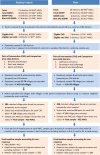Effects of an mHealth intervention for community health workers on maternal and child nutrition and health service delivery in India: protocol for a quasi-experimental mixed-methods evaluation
- PMID: 30918034
- PMCID: PMC6475202
- DOI: 10.1136/bmjopen-2018-025774
Effects of an mHealth intervention for community health workers on maternal and child nutrition and health service delivery in India: protocol for a quasi-experimental mixed-methods evaluation
Abstract
Introduction: Millions of children in India still suffer from poor health and under-nutrition, despite substantial improvement over decades of public health programmes. The Anganwadi centres under the Integrated Child Development Scheme (ICDS) provide a range of health and nutrition services to pregnant women, children <6 years and their mothers. However, major gaps exist in ICDS service delivery. The government is currently strengthening ICDS through an mHealth intervention called Common Application Software (ICDS-CAS) installed on smart phones, with accompanying multilevel data dashboards. This system is intended to be a job aid for frontline workers, supervisors and managers, aims to ensure better service delivery and supervision, and enable real-time monitoring and data-based decision-making. However, there is little to no evidence on the effectiveness of such large-scale mHealth interventions integrated with public health programmes in resource-constrained settings on the service delivery and subsequent health and nutrition outcomes.
Methods and analysis: This study uses a village-matched controlled design with repeated cross-sectional surveys to evaluate whether ICDS-CAS can enable more timely and appropriate services to pregnant women, children <12 months and their mothers, compared with the standard ICDS programme. The study will recruit approximately 1500 Anganwadi workers and 6000+ mother-child dyads from 400+ matched-pair villages in Bihar and Madhya Pradesh. The primary outcomes are the proportion of beneficiaries receiving (a) adequate number of home visits and (b) appropriate level of counselling by the Anganwadi workers. Secondary outcomes are related to improvements in other ICDS services, and knowledge and practices of the Anganwadi workers and beneficiaries.
Ethics and dissemination: Ethical oversight is provided by the Committee for the Protection of Human Subjects at the University of California at Berkeley, and the Suraksha Independent Ethics Committee in India. The results will be published in peer-reviewed journals and analysis data will be made public.
Trial registration number: ISRCTN83902145.
Keywords: child health and nutrition; impact evaluation; mhealth; quality in health care.
© Author(s) (or their employer(s)) 2019. Re-use permitted under CC BY. Published by BMJ.
Conflict of interest statement
Competing interests: DD is a Program Officer with the Measurement, Learning & Evaluation (MLE) team at the Bill & Melinda Gates Foundation (BMGF) India Country Office. BMGF has funded this study as well as the support to the scale-up of the ICDS-CAS programme. However, as part of the MLE team, DD has had no role in the ICDS-CAS program design or implementation and was responsible for conceptualizing and commissioning the evaluation. She continuous to advise on study design, analysis and communication of findings to stakeholders.
Figures




References
-
- International Institute for Population Sciences (IIPS) and ICF. National Family Health Survey (NFHS-4), 2015-16: India. Mumbai:: IIPS. 2017. http://rchiips.org/NFHS/NFHS-4Reports/India.pdf (accessed 7 Mar 2018).
-
- Gragnolati M, Bredenkamp C, Gupta MD, et al. . ICDS and Persistent Undernutrition: Strategies to Enhance the Impact. Econ Polit Wkly 2006;41:1193–201. 10.1111/cch.12531 - DOI
-
- Agarwal KN, Agarwal DK, Agarwal A, et al. . Impact of the integrated child development services (ICDS) on maternal nutrition and birth weight in rural Varanasi. Indian Pediatr 2000;37:1321–7. - PubMed
